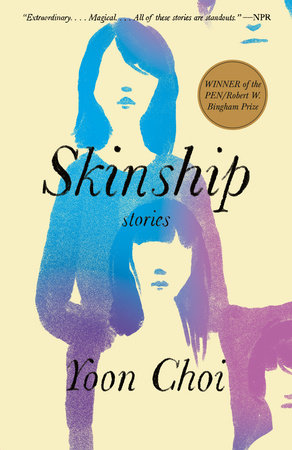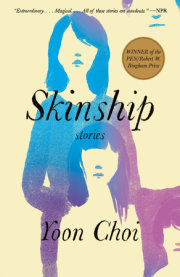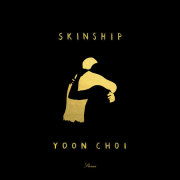The church of abundant life
Soo occupies the high stool behind the register as her husband, Jae, brings in the cartons of eggs, the infant formula, the glue traps, the dried beans, the Little Debbie cakes, the single rolls of toilet paper, the strawberry cigars, the Jamaican castor oil, the yellow boxes of S.O.S. steel wool, the cough syrup, the cereal, the hydroquinone cream, the little glass pipes of love roses, the foil-capped plastic barrel drinks called Little Hugs that their customers call grenades. It is a Wednesday. On Wednesdays, Jae restocks the store.
“Just see this,” he says to her in Korean, setting down a final stack of boxes. “Would you just take a look at this?” He takes a Chosun Ilbo from the top of a box and slaps it on the counter. She does not put up the reading glasses that she wears on a chain around her neck. Without them, she can only discern that what Jae has put in front of her is some kind of an ad.
Men, she says to herself in consolation.
Soo knows that if Jae has a Korean newspaper, he must have dropped by Mr. Ro’s corner store three blocks over. She can practically see the two of them, smoking and conferring on the concrete stoop. She knows their topics of conversation. The price of milk. North and South Korean politics. The Pennsylvania lotto. What worries her is when this talk results in a business idea. There was the time Jae and Mr. Ro drove back from the wholesalers on Broadway with a trunkload of weaves and wigs. She met the car at the curb with her arms crossed. There was just one thing she wanted to know. How much?
Ten thousand dollars, said Jae. Not to worry, they had used money from the kye.
Ten thousand dollars! The sum was so large that it didn’t strike her conscious mind so much as her conscience. That was the thing about the kye. Jae saw it as free money, and she saw it for what it was: a revolving loan. She grabbed a wig and shook it at Jae. She said with passion that no woman wanted cheap fake hair. Even poor black women didn’t want cheap fake hair. What women wanted was real hair, human hair, virgin Remy hair. And wasn’t she right. Didn’t those unsold wigs sit in their basement for years in black garbage bags until the mice got to them.
She is moved to action. She drops off the stool, comes around the counter, and pokes through the boxes and bags that Jae has brought in. She puts on her glasses, but she doesn’t address the paper on the counter. Instead, she holds up a jar of baby food and does a quick check of the ingredient list. Ground chicken, water, cornstarch. She picks up a carton of eggs, saying, “These aren’t brown, right? Remember what happened with the WIC vouchers and the brown eggs?”
Since these are not real questions but gestures, she doesn’t immediately notice that Jae is not responding. The front door bangs open, and a man makes his way to the register. “Telestial,” he says, and Soo goes behind the counter to unhook a calling card, which hangs on a pegboard beside the three-pack condoms. Puerto Rican, she thinks automatically.
The man leaves. Only then does she realize that Jae is in a state of absorption. It is so unusual for him to just stand at the counter, staring at a paper in the middle of a workday, that she looks at him sharply. Certain small things about him spring to her notice. The side-parted hair that he keeps a home-dyed black. The fishing vest with many pockets, where he keeps coins, keys, a utility knife, and a lighter. The clearish cluster of asbestos warts on the hand beside the paper. “Good old Ki-tae,” he says. “That poor son of a bitch.”
She can’t believe she has heard him correctly. Ki-tae? Hong Ki-tae?
She seeks her glasses at her throat and on the top of her head before realizing that they are on her face. She glances at the paper, and then, because Jae is there, she quickly looks away. She has not seen much more than the background of the ad, a small black-and-white speaker’s photo, and the word “Revival,” but she feels both excited and ridiculous.
“Ki-tae, the famous pastor,” Jae says to her. “Can you believe life.”
She finds this a surprisingly perfect thing for him to have said. Can you believe life indeed. It captures for her that feeling of having encountered the distant past. She looks again at the speaker’s photo and thinks that Ki-tae has aged well, with dignity—all things considered.
But after a moment’s solemnity, Jae raps the paper two times and recovers. “What’s that thing we used to call him? Was it monkey? Monkey-boy?”
He stoops to pick up some boxes, giving her a sad view of the top of his head. When he straightens up, he is all business.
“Mr. Ro has a guy who’s getting him Newports at thirty-eight dollars a box from Delaware. Thirty-eight dollars. What do we pay? Almost forty-five?”
And they’re back. The old arguments. The ongoing themes in their long marriage.
“Please,” she says, dismissing this with her hand. “Just . . . please.” She finds it remarkable that in all the years they’ve spent together—six-day weeks and fourteen-hour days—they still don’t agree on right and wrong. She considers his attitude to be convenient and self-compromising. Trying to get around a tax. Continuing to stock those stoppered glass tubes that hold small paper roses. Everyone knows what those are, really. Get rid of the rose, add a little copper wool, and you’ve got yourself a crack pipe.
Suddenly, Jae bolts. Soo knows, without looking, that the meter maid is coming. For decades, around this time every morning, the meter maid in her three-wheeled vehicle comes down their street in fits and starts. When he senses her approach, Jae jumps into the Buick parked on the yellow curb, makes a series of left turns on the presidential streets—Washington, Hamilton, Grant—and then parks right back in the no-parking zone in front of the store. His store: his curb. There is no way to make him see things differently.
With Jae gone, Soo returns to the ad.
revival! it reads.
how to live an abundant life!
teaching by reverend hong ki-tae!
She looks more closely at the photo. A gentle, pitted face; silver glasses; white hair. It is in fact a little like a monkey’s. Underneath the picture, there is a brief, inspirational bio. Born 1946, grew up in the village of Haengchi under Boduk Mountain, attended Seoul National University, further studies at Fuller Seminary in California. Author of such seminal works as Take This Cup and Out of Suffering Comes. There is no mention of the poor children. No mention of the wife.
In a drawer somewhere, she still has the card she attempted to write when they’d learned the news. It was all over the Korean papers. It was reported that as many as one in seven buildings in Seoul might be compromised. But in the end, she hadn’t had the words. She hadn’t gotten in touch, and neither, so far as she knew, had Jae. Incredibly, over the years, they had forgotten about it.
And now, the door bangs open. The workday is made up of such interruptions. Seeing Rhonda Jones, who works in the bank up the street, Soo reaches overhead to the cigarette display and locates the pusher shelves for the Marlboros blind. She has the pack on the counter before Rhonda, who has paused to catch her breath, has fully entered the store.
“You know me,” says Rhonda, laughing and gasping. Her rayon suit is stained under the armpits, and her teller’s name tag pulls down the lapel.
“Smoking is very bad,” says Soo in English. “When you go to quit.”
“I’m trying. Lord knows, I’m trying.” Rhonda sighs deeply as she opens an old-fashioned coin purse and roots for change. After a moment, she gives up trying to find enough quarters and dimes and hands over a twenty that has been folded over and over into a small square.
“Tomorrow,” says Rhonda as Soo hands over her change and her cigarettes. “I’m gone quit tomorrow!”
After Rhonda has gone, Soo returns to the ad. She now sees it differently, without sympathy or nostalgia. The picture of the large oak tree with many spreading branches. The topic of the revival, which is written in a leafy-green font with flourishes: abundant life. That word, “abundant.” In light of what everyone knows about Hong Ki-tae and the tragedy that made his name, is it not a touch defensive?
Then Soo notices, beneath the title and the speaker’s name, event details provided in a more modest lettering.
bethel baptist church of columbia, maryland
february 5, 2005, 8 p.m.
She sits motionless. This information affects her more than any picture of an oak tree, any beautiful word rendered in leafy green. She thinks:
Columbia is a ninety-minute drive down the 83.
February 5 is next Saturday.
*
In the fall of 1981—or, as Soo thinks of it, in another life—Park Soo-ah arrived at Newark International Airport with four immigrant bags. Jae-woo picked her up in a car that had been described to her as “almost new,” but the car was brown, touched up in varying shades of tan, and there was a slight depression in the hood that was lightly rimmed with rust.
“It is very nice,” she said in the formal Korean that wives use with their husbands, and in telling that lie, she was reassured of her love for him. She faintly tasted mint in her mouth and remembered that, right before landing, she had brushed her teeth in the airplane bathroom with a toothbrush packed for that very purpose. These were the tender courtesies of marriage, she told herself as her hand unconsciously went to pat the back of her hair. This is my husband, she thought. I am his wife.
They had been married for five years, but Jae-woo had been in America for the past two, moving around, connecting with old army buddies in places like Fort Lee or Atlanta. Friends who did import-export, or ran liquor stores, or sold golf equipment and visors. He was looking for what he called a business opportunity. His goal was to make money. “Make money” was one of the American phrases he had picked up, and it sounded strange in translation because the Korean idiom was to earn it.
She looked at his driving profile. His hands gripping the steering wheel.
“I changed my hair,” she said. “What do you think?”
“I like it,” he said, keeping his eyes on the road. He continued driving and didn’t say much more.
At first, she didn’t notice the quality of his silence. She was giddy with questions. He had not been able to tell her much on an international call about the life he had prepared for them. He simply said that he had found something, a store, and a place for them to live. But what was this store? And what would their house—their home—be like? She almost didn’t want to know, to prolong her feeling of excitement. At the same time, she schooled her anticipation. She told herself that they would start someplace modest, that she would be cheerful and resourceful.
As he drove, Jae-woo adjusted the quivering red line on the radio until he found a station playing a song from the sixties. Soo recognized the song. It was by a person named Simon Garfunkel. She always found herself moved by that line in the refrain: “Like a bridge over troubled water, I will lay me down.”
“Did I tell you about my latest interest?” she said. “I’m through with calligraphy. Now I crochet. I can make anything. Ask me what I can make. Hats. Blankets. Bootees. I must have made twelve pairs of bootees for all our friends who are having babies!”
She was a little breathless at having said this to him, at having hinted at the act of love and what could result. But in her body, she was not at all shy in her desire for a child. In the months before she left Korea, she had undergone a cycle of acupuncture and drunk daily decoctions of velvet deer antlers that the house girl brewed on the flat rooftop to keep out the smell.
The song ended, and then there were commercials. Ecstatic voices selling things in English. Mattresses. Insurance.
“I went to see your mother and older sister before I left,” she said as another song started up. This made him glance at her sharply. “I had to take a cab, a train, and two buses. I took them some honey medicine cookies and sour persimmons.”
“How did she seem?” asked Jae-woo.
“Your mother?” Soo-ah considered her answer. “She seemed at peace. I’m almost certain she recognized me, but your sister said I was mistaken.”
“And Eun-jung? How is she?”
Frankly, Jae-woo’s sister had seemed exhausted. Exhausted as a way of life, or exhausted as a form of reproach. But Soo-ah said none of those things.
“Older Sister had this message for you,” she said to Jae-woo. “She said to tell you—”
“What,” he interrupted, “that she needs money?”
“—to call or write from time to time.”
“Well then,” he said, looking dissatisfied.
She touched her hair again and wondered, despite what Jae-woo had said, whether her perm and drastic cut—her mother’s idea—had been a mistake.
“Have you heard about Hong Ki-tae?” she asked to change the subject. “Hong Ki-tae and that girl he married, the plain one, from his village. They had—guess what. Twins.”
“So they did,” said Jae-woo, driving on.
They drove the length of New Jersey, and then past a blue sign that said: pennsylvania welcomes you. She began to attend more closely to the landscape. Dry autumn cornfields and travel plazas and billboards at intervals. She hugged the purse on her lap and remembered that inside, along with her toothbrush and her passport, was an envelope full of American bills that her father had given to her. Also her gold first-birthday rings in a rainbow silk pouch. She thought with passing pity that Jae-woo had not had a happy family life. She thought of the dark, damp apartment in Suwon that he had shared with his mother and sister, the fading, dusty bolts of silk. She watched the exits flashing by and began to play a little game: This one. No, this one. After some time had passed, Jae-woo signaled and slowed for the Queen Street exit into downtown Lancaster.
Copyright © 2021 by Yoon Choi. All rights reserved. No part of this excerpt may be reproduced or reprinted without permission in writing from the publisher.






